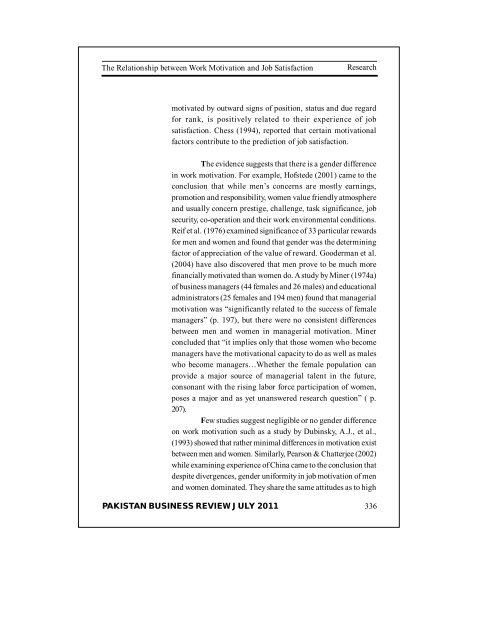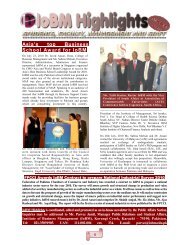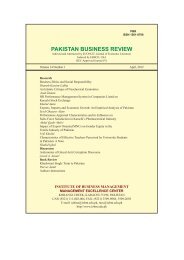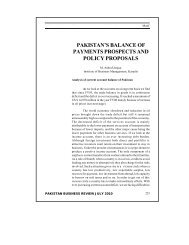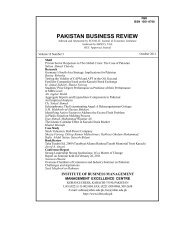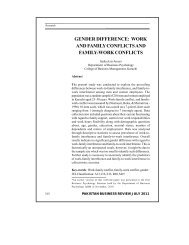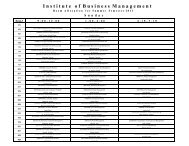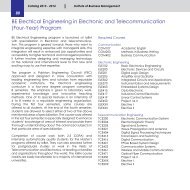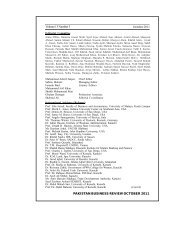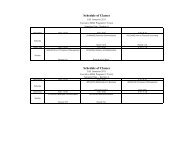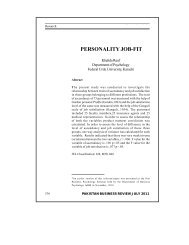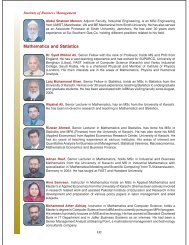PAKISTAN BUSINESS REVIEW - Institute of Business Management
PAKISTAN BUSINESS REVIEW - Institute of Business Management
PAKISTAN BUSINESS REVIEW - Institute of Business Management
You also want an ePaper? Increase the reach of your titles
YUMPU automatically turns print PDFs into web optimized ePapers that Google loves.
The Relationship between Work Motivation and Job Satisfaction<br />
Research<br />
motivated by outward signs <strong>of</strong> position, status and due regard<br />
for rank, is positively related to their experience <strong>of</strong> job<br />
satisfaction. Chess (1994), reported that certain motivational<br />
factors contribute to the prediction <strong>of</strong> job satisfaction.<br />
The evidence suggests that there is a gender difference<br />
in work motivation. For example, H<strong>of</strong>stede (2001) came to the<br />
conclusion that while men’s concerns are mostly earnings,<br />
promotion and responsibility, women value friendly atmosphere<br />
and usually concern prestige, challenge, task significance, job<br />
security, co-operation and their work environmental conditions.<br />
Reif et al. (1976) examined significance <strong>of</strong> 33 particular rewards<br />
for men and women and found that gender was the determining<br />
factor <strong>of</strong> appreciation <strong>of</strong> the value <strong>of</strong> reward. Gooderman et al.<br />
(2004) have also discovered that men prove to be much more<br />
financially motivated than women do. A study by Miner (1974a)<br />
<strong>of</strong> business managers (44 females and 26 males) and educational<br />
administrators (25 females and 194 men) found that managerial<br />
motivation was “significantly related to the success <strong>of</strong> female<br />
managers” (p. 197), but there were no consistent differences<br />
between men and women in managerial motivation. Miner<br />
concluded that “it implies only that those women who become<br />
managers have the motivational capacity to do as well as males<br />
who become managers…Whether the female population can<br />
provide a major source <strong>of</strong> managerial talent in the future,<br />
consonant with the rising labor force participation <strong>of</strong> women,<br />
poses a major and as yet unanswered research question” ( p.<br />
207).<br />
Few studies suggest negligible or no gender difference<br />
on work motivation such as a study by Dubinsky, A.J., et al.,<br />
(1993) showed that rather minimal differences in motivation exist<br />
between men and women. Similarly, Pearson & Chatterjee (2002)<br />
while examining experience <strong>of</strong> China came to the conclusion that<br />
despite divergences, gender uniformity in job motivation <strong>of</strong> men<br />
and women dominated. They share the same attitudes as to high<br />
<strong>PAKISTAN</strong> <strong>BUSINESS</strong> <strong>REVIEW</strong> JULY 2011<br />
336


